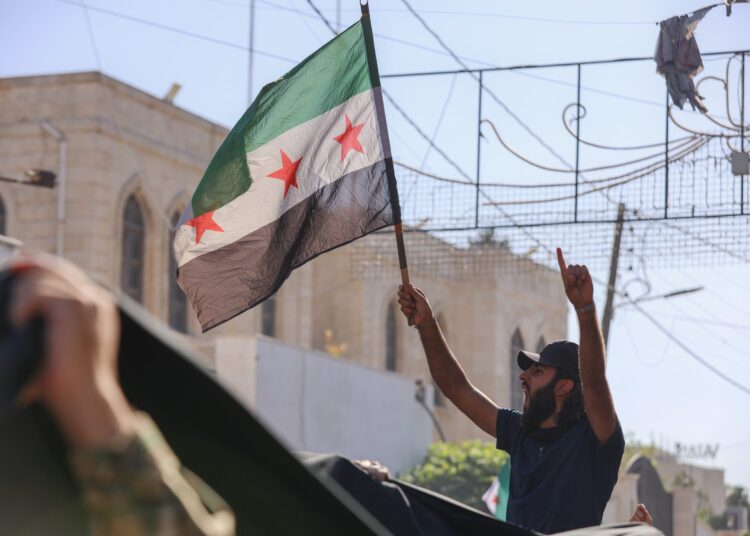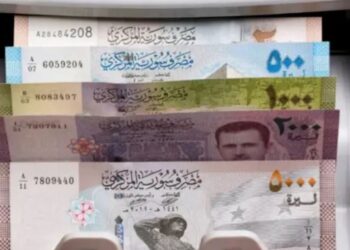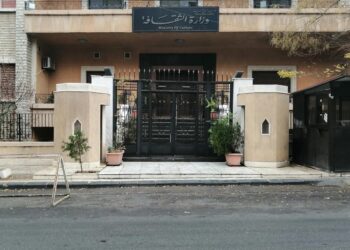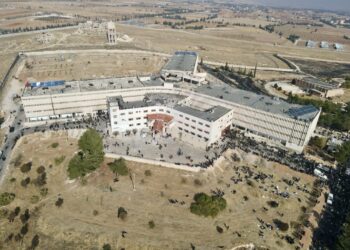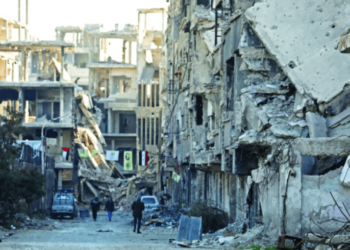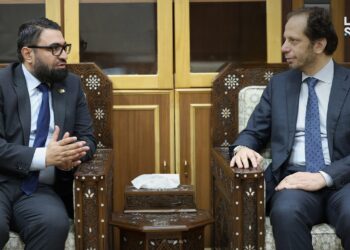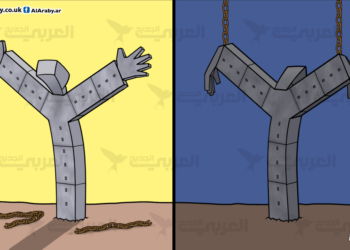(A paper prepared by the Executive Director of the Syrian Network for Human Rights)
This paper presents a critical reading of the Syrian Constitutional Declaration of 2025. It reviews the circumstances of its drafting, its content, and its institutional structure, highlighting its shortcomings and the opportunities available to transform it into a more inclusive and participatory transitional framework, balancing the requirements of stability and the principles of good governance.
Publication Context and Transitional Phase Objectives
The collapse of the Assad regime in December 2024 led to a dangerous constitutional and institutional vacuum, prompting the new authorities to issue a 53-article Constitutional Declaration in March 2025. Inspired by some elements of the 1950 Constitution, it pledged to establish a state of citizenship, freedom, and the rule of law. This paper asserts that the Declaration contributed to avoiding chaos and managing the transitional phase, combining positive elements, such as the enshrinement of human rights, with worrying elements such as the concentration of powers in the executive and the weakness of the participatory approach. Given its temporary nature and the possibility of amending it under Article 50, there is a realistic opportunity to reform it and make it the basis for an effective democratic transition.
The Legitimacy Criterion: Towards a Pluralistic and Participatory Constitutional Process
The legitimacy of transitional constitutional documents rests on their broad, participatory drafting process, not on the unilateral decisions of a victorious political or military authority. This paper proposes three pillars for achieving a credible democratic transition:
- A consensual governing body formed by national consensus, including representatives of political forces, civil society, trade unions, women, and youth, preventing the monopolization of power.
- A comprehensive national dialogue addressing fundamental issues such as the form of the state, the relationship between religion and politics, transitional justice, and minority rights.
- A representative constitutional drafting committee that translates the politically agreed-upon text into a legal framework, with the participation of experts, legal experts, and representatives of societal components, while ensuring transparency and popular review.
In practice: Executive Dominance and Structural Flaws
A procedural examination reveals that the declaration was marred by a number of shortcomings:
– Reducing politics to a technocratic approach; the declaration was prepared by a narrow committee by presidential decree, without broad national dialogue or genuine participation from all segments of society.
– Lack of political and social representation; the selection of committee members was based solely on legal and technical criteria, without consideration for balance, justice, and diverse representation.
As a result, the declaration was presented as a technical project devoid of the supposed national, participatory political character of constitution-making processes. It also suffers from fundamental flaws, as follows:
- Judicial subordination: Article 47 granted the president the sole authority to appoint Supreme Constitutional Court judges, while retaining broad powers within the Ministry of Justice over judicial affairs, thus depriving the judiciary of its effective independence.
- A sham parliament: Article 24 empowered the president to directly appoint one-third of the members of the People’s Assembly and to appoint the committee responsible for selecting the remaining two-thirds, ensuring the Assembly’s subordination to the executive branch. Article 30 also limited his role to “posing questions to ministers,” thus obstructing the oversight and legislative functions.
- Broad executive powers: The president monopolized constitutional amendments under Article 50 and was empowered to declare war and emergency through a council he appointed under Article 41. Article 37 granted him the final authority to ratify international treaties even after their parliamentary approval.
Rights and Freedoms in the 2025 Declaration: Between Clarification and Restriction
The paper discusses the system of rights and freedoms as stated in the Declaration and concludes as follows:
– The inclusion of international human rights treaties in Article 12 is a positive step. However, Article 23 allows for the restriction of rights under the pretext of “national security,” “public safety,” and other grounds without precise standards or effective judicial oversight, opening the door to arbitrary interpretations.
– The absence of fundamental democratic principles such as “popular sovereignty” and the term “democracy,” and the disregard of fundamental rights such as the freedom of assembly, peaceful demonstration, strike, the formation of independent unions, the right to access information, and effective political participation.
– The absence of genuine popular participation mechanisms in drafting the permanent constitution, such as civic education programs, public consultations, or referendums, weakens the procedural legitimacy of the transition.
A Roadmap for Reform: Structural Amendments for a Viable Transition
The Declaration remains open to reform, as Article 50 allows for its amendment upon the president’s proposal and the approval of two-thirds of the members of the People’s Assembly. This paper proposes a reform path that includes:
- The Supreme Constitutional Court: Article 47 stipulates that the president has the power to appoint all members of the court, undermining its independence. To strengthen constitutional oversight, an independent nominations committee is proposed, comprising representatives from the Supreme Judicial Council, the People’s Assembly, the Bar Association, law schools, and civil society organizations. This committee would adopt transparent selection procedures, with judges elected by the People’s Assembly by a two-thirds majority, with staggered nine-year terms to ensure institutional continuity.
- The People’s Assembly: To become a truly legislative institution representing Syria’s diversity, a tripartite representation mechanism (geographic/functional/civil society) is proposed, with integrity and competency criteria for candidates to be applied temporarily during a specific transitional period (three years) before general elections are held. The Assembly is also granted expanded powers, including the formation of investigative committees, withdrawal of confidence from ministers, approval of the appointment of senior officials, and effective oversight of the declaration of a state of emergency.
- Amendment to Article 23: The article, as currently drafted, provides for broad restrictions on rights and freedoms based on vague justifications. The following wording is proposed: “No restrictions may be imposed on the rights and freedoms set forth in this Declaration except as provided by law and as are strictly necessary in a democratic society to protect national security against real threats of violence or force, or to protect public safety in situations of clear and immediate danger, or to ensure respect for the rights and freedoms of others. Such restrictions must be proportionate to the aim pursued, must not be discriminatory, and must always be subject to judicial review, without prejudice to the essence of the right or freedom.”
- Essential additions to democratic participation:
– Freedom of assembly and peaceful demonstration: Recognizing the right to assemble and demonstrate without prior permission, subject to notification that does not constitute an actual permit, and prohibiting the use of force against peaceful assemblies.
– Access to information: Enshrining the right to access information concerning public authorities within specific and justified exceptions, with proactive dissemination of information of public importance.
– Political participation: Guaranteeing the right to participate directly or through elected representatives, to vote and run for office in free and fair elections, and equal opportunity to hold public office.
– Constitutional process: Establishing a constituent assembly with defined powers and a timetable for drafting a permanent constitution, thus dispelling ambiguity and ensuring a democratic transition.
Implementation Principles: Gradualism, Time Limits, and Technical Support To achieve a practical balance between stability and change, constitutional and legal reforms will be implemented gradually, beginning with the consolidation of rights, freedoms, and judicial independence, followed by legislative reforms linked to improved security conditions, leading up to comprehensive general elections. The application of exceptional measures will be limited to specific time periods that can only be renewed with the approval of a broad majority in the People’s Assembly. It is recommended to provide international technical support through an independent constitutional office to strengthen the capacity of national institutions to chart an independent democratic path, while maintaining sufficient constitutional flexibility to respond to political and social transformations without compromising fundamental democratic principles.
Conclusion
The Constitutional Declaration represents a starting point for development. The success of the transition remains contingent on a participatory national dialogue that ensures the representation of all components of Syrian society, transforming current challenges into an opportunity to draft a democratic constitution that embodies Syrians’ aspirations for a state of law and institutions.
